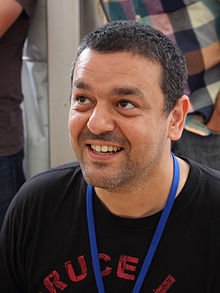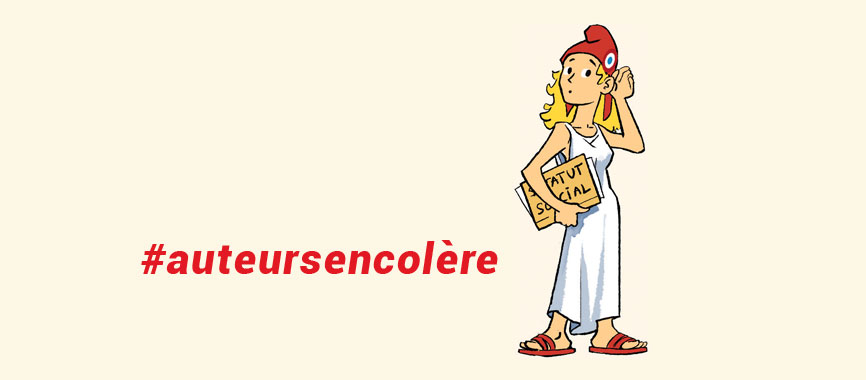There’s a growing chorus of angry authors and artists in France debating the status of writers and their place in society. Writers and comics artists have been mobilizing in the last few months over three major issues: the increase in CSG (from %7.5 to %9.2), the upcoming pension reforms following the devastating RAAP (Régime des artistes auteurs professionnels) reforms of 2016 and the lack of consultation with writers. The CSG, or Contribution Sociale Généralisé, is a mandatory tax that contributes to the financing of the social security net in France. The CSG goes to support Health Insurance, Family allocations, national debt and old age pension. The increase was not foreseen and wouldn’t normally a major issue, however, in January 2016, a major reform to the RAAP, a sort of status that provides authors with a special taxation status, would go from barely nothing to a full 8% was completed without consultations with authors. The RAAP used to allow for authors to determine the amount that would be put into their pension funds, with this new percentage, authors are now obligated to put a 8% (a full months salary) into their pensions The RAAP and CSG increase means that writers have collectively asked to pay for an additional %9.7 in taxes since 2015. This is quite steep. These latest issues, coupled with the over-production and impoverishment of writers has created a situation ripe for discontent.
In late June, a number of influential writers and cartoonists (including Joann Sfar and Pénélope Bagieu) co-signed a statement on the precarious status of their profession and the need for support and launched #AuteursEnColère to properly explain their grievance. Being a writer is a financially challenging job, whether in France or North America, and surviving on a writers salary is not easy. In France, an estimated 41% of writers are living below the poverty line.
These new fiscal reforms triggered by the government have been poorly welcomed by writers, comics makers and cartoonists. This increase in CSG might seem insignificant, but this would require writers and artists to pay their taxes in advance as if they were independent contractors. However, living on a writers salary usually means that you get an advance to work on your book and eventually royalties on book sales that could usually hovers around 10% of the book value. It can quickly become challenging to survive and make a career in the field while paying for your living expenses and seeing your yearly income reduced so drastically in such a short period of time.

The current French government tried to alleviate some of those fears and increase dialog between the writers community and government last year by naming Françoise Nyssen, the former editor of Actes Sud, a large French publisher, as their minister of culture. However, earlier last week, the government basically removed the mandate of “literature” from Nyssen, citing that she was too close to writers to properly assess the situation. Many, including Joann Sfar, have been very critical of this, pointing how absurd it is to have a minister responsible for culture that doesn’t include literature. What’s the point of hiring someone in the publishing world to manage the industry if she can’t do anything about it. Her expertise should be considered an asset, not a liability.
Sfar, the writer and cartoonist behind Pascin, The Rabbi’s Cat and many other graphic novels has been using the launch of his new graphic novel Aspirine to promote his book and to talk about the current issues facing writers. Essentially, writer is becoming an endangered career and will be nearly impossible for many in the future. Taxes are high, advances are low, royalties are low. Writers can try to negotiate with their publisher for better rates or advances, but the problem will remain if the French government doesn’t address these other issues. Sfar has been pointing out that should the government continue to coast, refuse to consult with writers and avoid the issues facing them, the French literary world will simply collapse. Writers will simply stop writing if they can’t afford food anymore.
What is the place of authors in French society? Are writers simply independent contractors? Is writing as a profession even viable in our modern world? These are ongoing questions and issues that won’t be fixed easily. The publishing world is much different than it was twenty or even ten years ago. This story is developing and we’ll see how the government reacts in the next few months.
If you speak or read French, you can find a comprehensive list of the current issues, as well as next steps and suggestions over at the AuteursEnColere website. It provides a fantastic deep look on the future of the status of authors and economic models underlying the career and the book industry compiled by the Conseil Permanent des Écrivains, an organization representing French authors.









Are you sure that’s a picture of Joann Sfar?
That is definitely a picture of Joann Sfar
This is a recurring problem with French law, not just BD authors. French politicians are so stupid (or devious) that most of our laws, instead of putting every French citizen on equal footing, keeps creating small bubbles of exemption, of privilege, of advantages for such or such category of people, under the pretext of “correcting inequality”, which only creates more. The smart move would be to let everyone put the amount of money they want in either health or pension funds but, you know, dividing makes conquering easier.
Americans have their tax cuts and their subsidized farmers too, so I guess we’re not alone.
Comments are closed.